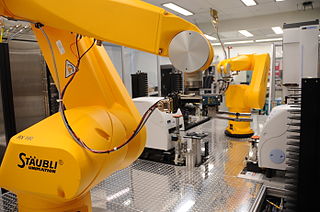
The UL enterprise is a global private safety company headquartered in Northbrook, Illinois, composed of three organizations, UL Research Institutes, UL Standards & Engagement and UL Solutions.
BACnet is a communication protocol for building automation and control (BAC) networks that use the ASHRAE, ANSI, and ISO 16484-5 standards protocol.

Laboratory robotics is the act of using robots in biology, chemistry or engineering labs. For example, pharmaceutical companies employ robots to move biological or chemical samples around to synthesize novel chemical entities or to test pharmaceutical value of existing chemical matter. Advanced laboratory robotics can be used to completely automate the process of science, as in the Robot Scientist project.

A microplate, also known as a microtiter plate, microwell plate or multiwell, is a flat plate with multiple "wells" used as small test tubes. The microplate has become a standard tool in analytical research and clinical diagnostic testing laboratories. A very common usage is in the enzyme-linked immunosorbent assay (ELISA), the basis of most modern medical diagnostic testing in humans and animals.

High-throughput screening (HTS) is a method for scientific discovery especially used in drug discovery and relevant to the fields of biology, materials science and chemistry. Using robotics, data processing/control software, liquid handling devices, and sensitive detectors, high-throughput screening allows a researcher to quickly conduct millions of chemical, genetic, or pharmacological tests. Through this process one can quickly recognize active compounds, antibodies, or genes that modulate a particular biomolecular pathway. The results of these experiments provide starting points for drug design and for understanding the noninteraction or role of a particular location.

The International Society of Automation (ISA), formerly known as The Instrumentation, Systems, and Automation Society, is a non-profit technical society for engineers, technicians, businesspeople, educators and students, who work, study or are interested in automation and pursuits related to it, such as instrumentation. It was originally known as the Instrument Society of America. The society is more commonly known by its acronym, ISA, and the society's scope now includes many technical and engineering disciplines. ISA is one of the foremost professional organizations in the world for setting standards and educating industry professionals in automation. Instrumentation and automation are some of the key technologies involved in nearly all industrialized manufacturing. Modern industrial manufacturing is a complex interaction of numerous systems. Instrumentation provides regulation for these complex systems using many different measurement and control devices. Automation provides the programmable devices that permit greater flexibility in the operation of these complex manufacturing systems.
LonTalk is a networking protocol. Originally developed by Echelon Corporation for networking devices over media such as twisted pair, powerlines, fiber optics, and RF. It is popular for the automation of various functions in industrial control, home automation, transportation, and buildings systems such as lighting and HVAC, the protocol has now been adopted as an open international control networking standard in the ISO/IEC 14908 family of standards. Published through ISO/IEC JTC 1/SC 6, this standard specifies a multi-purpose control network protocol stack optimized for smart grid, smart building, and smart city applications.
Laboratory informatics is the specialized application of information technology aimed at optimizing and extending laboratory operations. It encompasses data acquisition, instrument interfacing, laboratory networking, data processing, specialized data management systems, a laboratory information management system, scientific data management, and knowledge management. It has become more prevalent with the rise of other "informatics" disciplines such as bioinformatics, cheminformatics and health informatics. Several graduate programs are focused on some form of laboratory informatics, often with a clinical emphasis. A closely related - some consider subsuming - field is laboratory automation.

The Association for Laboratory Automation (ALA) was a scientific association, organized as a nonprofit 501(c)(3), for the medical, chemical and biological laboratory automation industry. It was the publisher of the peer-reviewed scientific journal, Journal of Laboratory Automation. In 2010, it merged with the Society for Biomolecular Sciences to form the Society for Laboratory Automation and Screening.

Laboratory automation is a multi-disciplinary strategy to research, develop, optimize and capitalize on technologies in the laboratory that enable new and improved processes. Laboratory automation professionals are academic, commercial and government researchers, scientists and engineers who conduct research and develop new technologies to increase productivity, elevate experimental data quality, reduce lab process cycle times, or enable experimentation that otherwise would be impossible.
The Association of Biomolecular Resource Facilities (ABRF) is dedicated to advancing core and research biotechnology laboratories through research, communication, and education. ABRF members include over 2000 scientists representing 340 different core laboratories in 41 countries, including those in industry, government, academic and research institutions.
Dean Ho is a Provost's Chair Professor in the Departments of Biomedical Engineering and Pharmacology, Director of the N.1 Institute for Health, and Head of the Department of Biomedical Engineering at the National University of Singapore. He was previously a professor at UCLA, and associate professor in the Departments of Biomedical Engineering and Mechanical Engineering in the Robert R. McCormick School of Engineering and Applied Science, and Full Member of the Robert H. Lurie Comprehensive Cancer Center at the Feinberg School of Medicine of Northwestern University, Illinois, United States.
GreenSpring Computers was a computer manufacturer founded in 1984 by Leonard and Henry Lehmann in Redwood City, California.
SLAS Discovery is a peer-reviewed scientific journal published by the Society for Laboratory Automation and Screening (SLAS) in partnership with SAGE Publications. The editor-in-chief is Robert M. Campbell, Ph.D.. The journal explores how scientists develop and utilize novel technologies and/or approaches to provide and characterize chemical and biological tools to understand and treat human disease. This includes scientific and technical advances in target identification/validation; biomarker discovery; assay development; virtual, medium- or high-throughput screening; lead generation/optimization; chemical biology; and informatics. The journal was published from 1996 through 2016 with the title Journal of Biomolecular Screening. Its name changed in 2017 to more accurately reflect the evolution of its editorial scope.[1]
PackML is an industry technical standard for the control of packaging machines, as an aspect of industrial automation.
SLAS Technology is a peer-reviewed scientific journal published by the Society for Laboratory Automation and Screening in partnership with Elsevier. The editor-in-chief is Edward Kai-Hua Chow, Ph.D.. The journal explores ways in which scientists adapt advancements in technology for scientific exploration and experimentation, especially in life sciences research and development. This includes drug-delivery; diagnostics; biomedical and molecular imaging; personalized and precision medicine; high-throughput and other laboratory automation technologies; micro/nanotechnologies; analytical, separation and quantitative techniques; synthetic chemistry and biology; informatics ; and more. The journal was published from 1996 through 2016 with the title Journal of Laboratory Automation. Its name changed in 2017 to more accurately reflect the evolution of its editorial scope.[1]

Society for Laboratory Automation and Screening (SLAS) is a scientific and professional society formed in 2010 as a merger between the Association for Laboratory Automation and the Society for Biomolecular Sciences. The mission of SLAS is "to bring together researchers in academia, industry and government to advance life sciences discovery and technology via education, knowledge exchange and global community building."

Elisabeth MJ Verpoorte is a professor of microfluidics and miniaturized "lab-on-a-chip" systems in the Faculty of Science and Engineering at the University of Groningen, Netherlands.

Anne E. Carpenter is an American scientist in the field of image analysis for cell biology and artificial intelligence for drug discovery. She is the co-creator of CellProfiler, open-source software for high-throughput biological image analysis, and a co-inventor of the Cell Painting assay, a method for image-based profiling. She is an Institute Scientist and Senior Director of the Imaging Platform at the Broad Institute.









